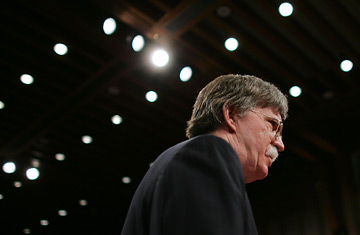
John Bolton.
You have been outspoken in your advocacy of using military means to remove regimes. Why do you consider this such an attractive option?
BOB WEINSTEIN, SAN DIEGO
It's a question of how you deal with the most serious threats to the U.S. There are regimes that I don't think are susceptible to being talked out of their nuclear weapons.
How should Iranians feel about the unfriendly threats of war issued by the U.S.?
ALI FARROKHIAN, TEHRAN
Our concern is not with the Iranian people, and I think we've gone out of our way to make it clear. If it ever did come to the use of military force, we need to make it clear to the people of Iran that this is not aimed against them.
Is there is a diplomatic solution to the Iranian ambition for nuclear weapons?
MEMI SOFER, BE'ER SHEVA, ISRAEL
There might have been four years ago, but I think we've passed that point. Iran is not going to be chatted out of its nuclear-weapons ambitions.
Why does the U.S. have different standards for nations developing nuclear technology?
ALTI MÁR SIGUROSSON, REYKJAVIK
Because different countries are different. I would not fear an Iceland with nuclear weapons any more than I fear a Britain with nuclear weapons. I do fear Iran or North Korea with nuclear weapons.
Given the U.N.'s endemic inertia, corruption and competing national agendas, do you think it still serves America's national interest to be a member?
ROBERT MEEKS, EL PASO, TEXAS
It does, although it's not a body that I would rest our foreign policy on. The U.N. [however] can be a useful instrument of American foreign policy.
What is your opinion of the India/U.S. nuclear deal? Do you support or oppose it?
SUREN DEVALA HUNTINGTON, NEW YORK
I don't think it's a very good deal from the U.S. point of view. I do think that accepting the reality that [India and Pakistan would have] nuclear weapons had to come to the center of American foreign policy. But this particular deal with India was inadequate.
What do you think is the root cause of the anti-American sentiment sweeping the nations of the world?
BEN WONG
CHRISTCHURCH, NEW ZEALAND
I don't think there's anti-American sentiment sweeping the world. The U.S. is most responsible for peace and security in the world. We didn't ask for that [role]. But I would say to people who hold that view, Be careful what you ask for. Because if you say, "America, go home," at some point, we may just do it.
Who are your diplomatic role models and why?
TOM ATWOOD, CHARLOTTE, N.C.
[Secretary of State] James Baker, who I served under in the first Bush Administration. He knew how politics operated both domestically and internationally.
What has been the biggest foreign policy mistake of the current Administration?
KEITH KUPER, ACKLEY, IOWA
The one that's still unfolding. The Administration has taken a U-turn on how to handle the threat of proliferation of nuclear weapons from countries like North Korea and Iran.
Is it possible for the U.S. to win the war in Iraq with our current strategy?
RUXIANG WU, ATLANTA
The surge policy is the only coherent policy we can follow. I think people need to calculate the adverse consequences for our friends and allies in the region if we withdraw precipitously from Iraq.
